Who wouldn’t want a house on the beach? For some on Israel’s far-right, desirable beachfront now includes the sands of Gaza.
Just ask Daniella Weiss, 78, the grandmother of Israel’s settler movement, who says she already has a list of 500 families ready to move to Gaza immediately.
“I have friends in Tel Aviv,” she says, “so they say, ‘Don’t forget to keep for me a plot near the coast in Gaza,’ because it’s a beautiful, beautiful coast, beautiful golden sand”.
She tells them the plots on the coast are already booked.
Mrs Weiss heads a radical settler organisation called Nachala, or homeland. For decades, she has been kickstarting Jewish settlements in the Israeli-occupied West Bank and East Jerusalem, on Palestinian land captured by Israel in the 1967 Middle East war.
Some in the settler movement have cherished the dream – or pipedream – of returning to Gaza since 2005, when Israel ordered a unilateral pullout, 21 settlements were dismantled and about 9,000 settlers were evacuated by the army. (Reporting from Gaza at the time, I saw many who were literally dragged out.)
Many settlers saw all this as a betrayal by the state, and a strategic mistake.
Opinion polls suggest that most Israelis oppose resettling Gaza, and it is not government policy, but since the Hamas attacks on 7 October it is being talked about out loud – by some of the loudest and most extreme voices in Israel’s government.
Mrs Weiss proudly shows me a map of the West Bank with pink dots indicating Jewish settlements. The dots are scattered all over the map, eating away at land where Palestinians hope – or hoped – to build their state.
There are about 700,000 Jewish settlers in these areas now and settler numbers are rising fast.
The vast majority of the international community considers settlements illegal under international law, including the United Nations Security Council. Israel disputes this.
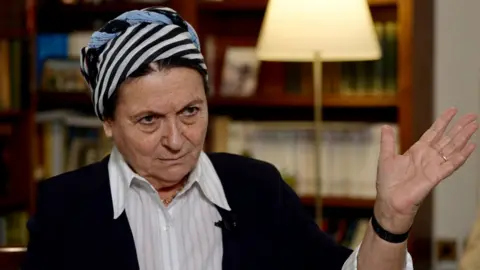
We meet Daniella at her home in the West Bank settlement of Kedumim, where red-roofed houses are spread over hilltops and valleys. She’s in constant motion despite having an arm in plaster.
Her vision for the future of Gaza – now home to 2.3 million Palestinians, many of them starving – is that it will be Jewish.
“Gaza Arabs will not stay in the Gaza Strip,” she says. “Who will stay? Jews.”
She claims that Palestinians want to leave Gaza and that other countries should take them in – although in a lengthy interview, she rarely uses the word “Palestinian”.
“The world is wide,” she says. “Africa is big. Canada is big. The world will absorb the people of Gaza. How we do it? We encourage it. Palestinians in Gaza, the good ones, will be enabled. I’m not saying forced, I say enabled because they want to go.”
There is no evidence that Palestinians want to leave their homeland – although many may now dream of escaping temporarily, to save their lives. For most Palestinians, there is no way out. The borders are tightly controlled by Israel and Egypt, and no foreign countries have offered refuge.
I put it to her that her comments sound like a plan for ethnic cleansing. She does not deny it.
“You can call it ethnic cleansing. I repeat again, the Arabs do not want, normal Arabs do not want to live in Gaza. If you want to call it cleansing, if you want to call it apartheid, you choose your definition. I choose the way to protect the state of Israel. “
A few days later, Daniella Weiss is selling the idea of a return to Gaza over cake and popcorn at a small gathering, hosted by another settler in their living room.
She has a projector, showing a new map of Gaza, complete with settlements, and leaflets entitled “Go back to Gaza”.
“People are asking me what the odds are this will happen?” she says.
“What were the odds back then when I came to these dark mountains and made it into this heaven?”
The handful in attendance seem already convinced. “I want to go back immediately,” says Sarah Manella. “When they call me, I will go back to Gush Katif [the former Israeli settlement bloc in Gaza].”
What about the people who live there, we ask.
“The area is empty now, “she replies. “Now you don’t need to think where to put the settlement, you only need to come back and put a new settlement.”
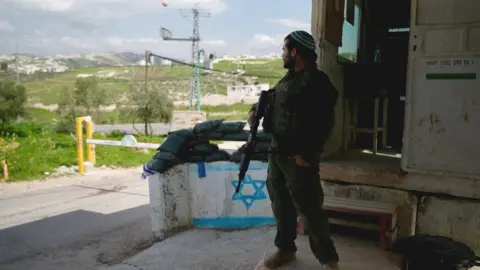
Gaza is far from empty, but much of it has been erased after almost six months of relentless Israeli bombardment.
It is the “greatest open-air graveyard” in the world, in the words of the EU’s foreign policy chief, Josep Borrell.
More than 32,000 Palestinians have been killed, according to the Hamas-run health ministry in Gaza, most of them women and children. The World Health Organization regards the ministry’s data as credible.
For some in the Israeli cabinet, the Palestinian territory – now drenched in blood – is ripe for resettlement. That includes Israel’s hard-right National Security Minister Itamar Ben Gvir – a settler himself.
In late January, he made his way through a packed conference hall, slowed by embraces and handshakes. He was among friends – about 1,000 ultranationalists pushing for a return to Gaza at the event entitled Settlement Brings Security.
Mr Ben Gvir, who favours “encouraging emigration”, was among a dozen cabinet ministers in attendance.
“It’s time to go back home,” he said from the stage, to loud applause. “It’s time to return to the land of Israel. If we don’t want another 7 October, we need to return home and control the land.”
In the shade of a sprawling tree, Yehuda Shimon is playing with his two young sons, who are in hammocks, hanging from the branches.
He has raised 10 children here in a settler outpost in the West Bank called Havat Gilad, or Gilad’s Farm, near the Palestinian city of Nablus.
All around him there are Palestinian villages, the nearest 500m away. There is no contact between them, he says.
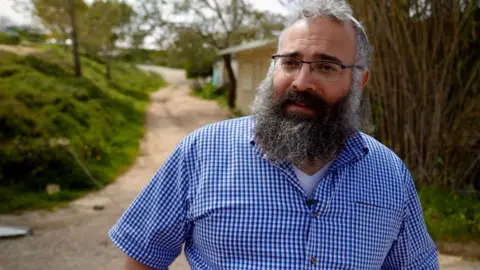
Shimon has lived in Gaza in the past and claims a God-given right to return.
“We must do it. It’s part of Israel area,” he says. “This is the land that God gave us, and you couldn’t go to God and tell him, ‘OK you gave me, and I gave to other people.’ No. I believe in the end we will go back to Gaza.”
I ask what this means for the Palestinians.
“They have 52 other places to go in the world,” he says, “52 Muslim countries”. He says the new Gaza will be “another Tel Aviv”.
Outposts like his are multiplying in the West Bank, along with larger settlements, fragmenting Palestinian territory and stoking tension.
Settler attacks on Palestinians have surged since 7 October according to the UN, which has long condemned settlements as “an obstacle to peace”.
And now settler organisations have their eyes on Gaza once again.
Is there a real prospect of settlers reaching the beachfront in Gaza?
A seasoned Israeli journalist told me it won’t happen. “Calls to resettle Gaza won’t be translated into policy,” he said.
Then he added: “Famous last words.”
Additional reporting by Wietske Burema, Goktay Koraltan and Ariel Tagar







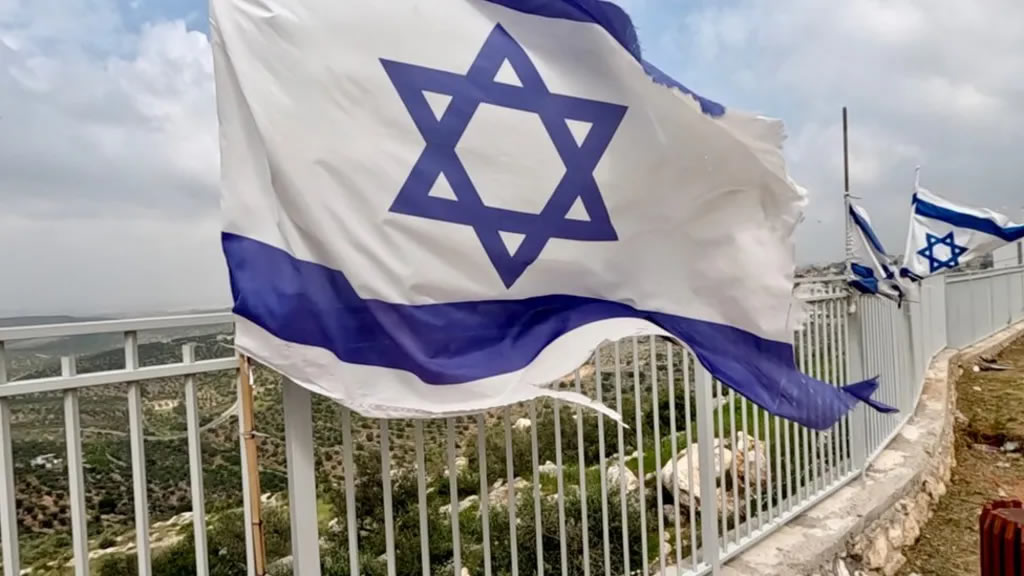
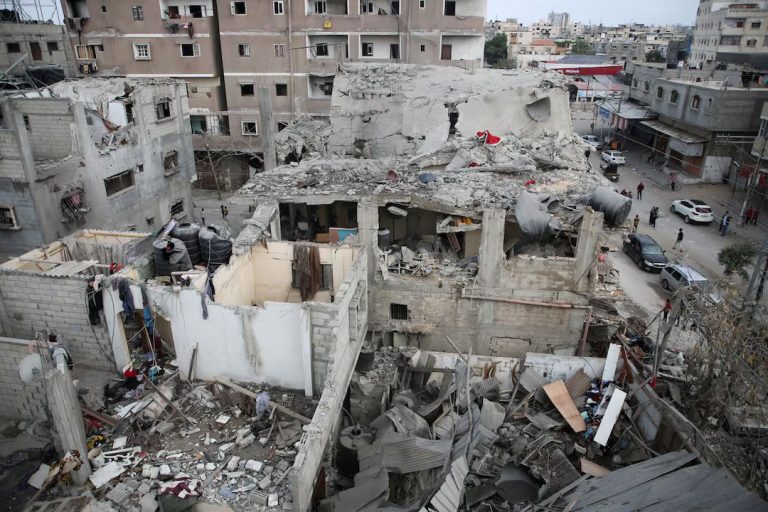
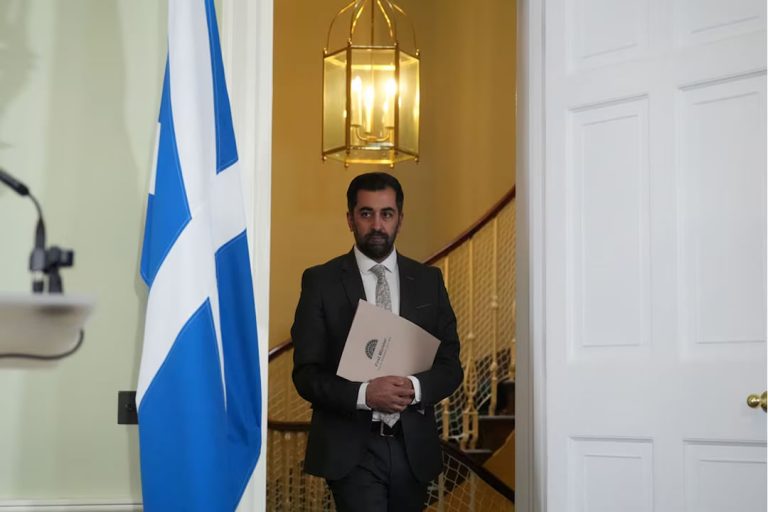
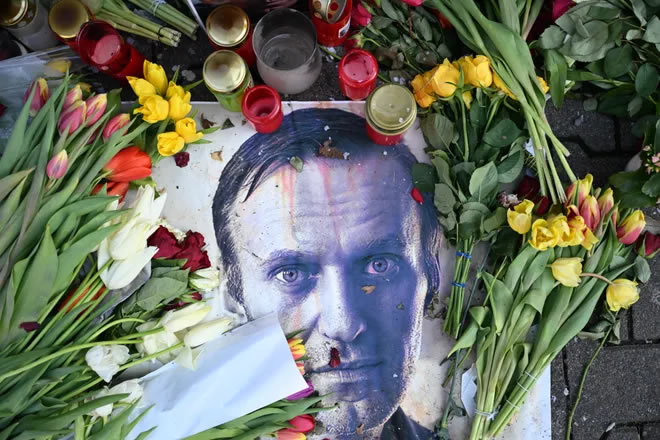




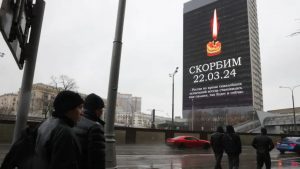



+ There are no comments
Add yours